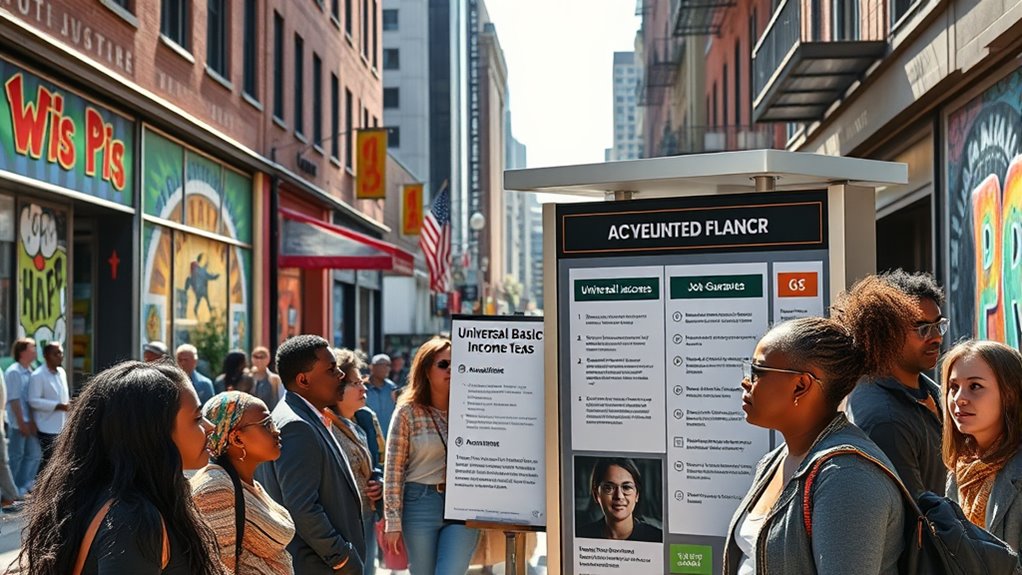Both UBI and a Job Guarantee aim to secure your future work, but they do so differently. UBI offers unconditional income that frees you to pursue learning or adapt to changing jobs, while a JG provides stable employment with skills preservation. UBI promotes income security for all, but JG ensures steady work and local economic growth. To understand which matches your needs best, explore more about each approach’s strengths and challenges.
Key Takeaways
- UBI promotes flexibility and lifelong learning, adapting to technological changes, but may reduce workforce participation in low-wage jobs.
- Job Guarantee ensures stable employment and skill retention, directly supporting economic stability during economic cycles.
- UBI reduces income inequality and social stigma, fostering social cohesion and community engagement for a resilient future.
- JG maintains workforce engagement and practical skills, preparing workers for evolving job markets through continuous employment.
- Combining UBI’s income security with JG’s employment opportunities offers a comprehensive approach to securing the future of work.
Comparing the Core Principles of UBI and Job Guarantee Programs

When comparing the core principles of Universal Basic Income (UBI) and Job Guarantee (JG) programs, it is vital to understand their distinct focuses. UBI provides a guaranteed income to everyone, regardless of employment status, emphasizing income security without requiring work. In contrast, JG aims to offer employment opportunities for all willing and able to work, focusing on job availability and maintaining employability skills. UBI is generally less costly at the state level and can be implemented more widely, while JG tends to be more feasible at local levels due to administrative complexities. JG also often includes benefits like health and pension plans and emphasizes social safety nets, whereas UBI relies on individuals to manage their income without tying it directly to employment. These fundamental differences shape their approaches to economic security. Furthermore, the implementation of JG can serve as an automatic stabilizer during economic downturns, helping to maintain demand and reduce involuntary unemployment.
Impact on Poverty Reduction and Income Stability

Both Universal Basic Income (UBI) and Job Guarantee (JG) programs aim to reduce poverty and improve income stability, but they do so through different mechanisms.
- UBI markedly lowers poverty by providing unconditional cash, raising income floors, and cutting poverty rates by over half without extra costs.
- It helps close income gaps, especially benefiting low-income households and reducing reliance on complex welfare systems.
- UBI enhances financial security, allowing better access to healthcare and education, which are essential for escaping poverty.
- JG ensures stable wages through guaranteed employment, stabilizing household incomes and promoting social inclusion. However, its effectiveness depends on the quality of available jobs and may exclude those unable to work.
- The implementation of UBI can be designed to be cost-effective and scalable, making it adaptable to different economic contexts and needs cost-effectiveness of UBI. Additionally, the administrative simplicity of UBI systems can reduce bureaucratic overhead and improve efficiency.
- Universal coverage is a key feature that can help streamline distribution and ensure no vulnerable groups are left behind.
Effects on Workforce Engagement and Skill Preservation

Both UBI and Job Guarantee programs impact how you stay engaged and keep your skills sharp, but they do so differently. UBI offers financial stability that can encourage education and retraining, while JG provides ongoing work that maintains practical skills. Considering how each approach supports motivation and skill development is key to understanding their long-term effects on the workforce. Additionally, integrating diverse and creative employment opportunities can further enhance skill preservation and worker engagement over time. Fostering a culture of continuous learning within these programs can amplify their effectiveness in preparing workers for evolving job markets, especially through practices like reskilling and upskilling. Incorporating carrier oils for essential oil rollers can also serve as a metaphor for blending different strategies to create a well-rounded approach to workforce development.
Skill Development Opportunities
Universal Basic Income (UBI) enhances workforce engagement by removing financial barriers that often hinder skill development and career advancement. With financial security, you can pursue education and training without fearing income loss. UBI encourages you to invest in skills, as seen in Uganda’s trial, where participants increased earnings by 38% and work hours by 17%, investing in skills and assets. It also promotes long-term planning for further education and career growth. Your ability to avoid low-wage, unstable jobs improves, allowing you to focus on skill building. Specifically:
- You’re more likely to pursue additional training and education.
- You can invest in personal development and business ventures.
- You’re empowered to shift between jobs or learn new skills.
- You maintain flexibility for informal, lifelong learning opportunities.
Employment Stability Support
When you have financial security through UBI, you’re less pressured to accept unsuitable or exploitative jobs, allowing you to wait for better matches that align with your skills and goals. This stability encourages you to stay engaged in the workforce longer, reducing involuntary job turnover and the costs associated with frequent hiring. Because there’s no fear of losing essential support, you can pursue roles that truly fit your talents and interests. Evidence from Finland’s trials shows minimal negative effects on employment rates, and marginalized groups often participate more actively with financial barriers removed. Overall, UBI’s unconditional payments help you maintain your skills, stay motivated, and participate more fully in the labor market, fostering a more stable, engaged, and skilled workforce. Providing a consistent financial baseline can also help individuals plan for the future and invest in their personal development. Additionally, workforce engagement is strengthened when individuals feel secure enough to develop their skills without immediate financial pressure, which can be further supported by innovations in alternative investments like Gold IRAs, offering additional avenues for financial growth. Moreover, skill preservation benefits from the stability provided by UBI, enabling workers to pursue ongoing education and training opportunities without the fear of income loss. Incorporating electric bikes into transportation options can also enhance workforce mobility and reduce commuting costs, further supporting workforce stability. Furthermore, advancements in machine learning can optimize job matching systems, making it easier for individuals to find roles suited to their skills and preferences.
Motivation for Work
Financial security through UBI can influence your motivation to work in complex ways. It may reduce external incentives, making you less driven by financial rewards. This could lead to:
- A decline in labor participation, as some might choose leisure over work.
- Reduced hours for low earners who no longer see work as necessary.
- Less motivation to increase productivity or take on extra hours for higher pay.
- A shift toward job flexibility, allowing you to seek roles better suited to your interests or skills.
– Intrinsic motivation might increase as individuals are more free to pursue passions rather than just income, which can positively influence overall engagement.
While UBI can empower you to choose meaningful work, it might also diminish the urgency to stay engaged. Balancing financial security with motivation remains a critical concern in future work models. Additionally, research suggests that overall labor participation may not significantly decrease, as autonomous motivation for meaningful engagement can increase with certain design considerations.
Economic Stability and Inflation Control Mechanisms

Economic stability and inflation control mechanisms are central to evaluating the viability of UBI and JG programs. You should consider that UBI doesn’t inherently cause inflation; its impact depends on whether the economy operates near full capacity. If demand increases without matching supply, prices could rise, but UBI may also reduce inflation by boosting productivity and reducing inequality. For JG, stabilizing incomes directly can prevent inflation if wage policies are well-managed. Both programs require careful coordination to avoid overheating or underutilization. Proper funding mechanisms, like taxes or disciplined spending, help maintain stability. Understanding the fluctuations in demand is crucial for effective implementation of these programs. Additionally, technological advancements in heat pump efficiency and noise reduction can influence energy costs, which are an important factor in overall economic stability. Moreover, ongoing research into personality traits can inform targeted policies that support workforce resilience and adaptability during economic transitions. Recognizing the importance of economic monitoring can further aid in adjusting policies to maintain stability and prevent inflationary pressures.
Addressing Social Justice and Equitable Access

You need to contemplate how income distribution affects social justice, as UBI offers a universal baseline that can reduce disparities, but may not fully address geographic or systemic barriers. Universal baseline can serve as a foundation for social equity while acknowledging existing structural inequalities. Job Guarantee programs, on the other hand, directly connect support to work opportunities, promoting inclusion for marginalized groups. Ensuring equitable access requires designing policies that prioritize work accessibility and actively include marginalized voices. resource allocation is critical in shaping how effectively these programs can reach and benefit diverse populations. Establishing comprehensive social and economic conditions is essential before implementing these programs to prevent reinforcing existing inequalities. Additionally, understanding the impact of resource allocation can help in creating more effective and fair solutions. Moreover, implementing robust fraud prevention tools can help safeguard these programs from misuse and ensure resources are directed to those in need. For instance, understanding drivetrain components can improve maintenance and longevity, ensuring the sustainability of programs and infrastructure.
Equal Income Distribution
Universal Basic Income (UBI) aims to distribute income equally among all residents, promoting social justice by removing barriers and stigma associated with means-tested programs. This approach guarantees everyone receives a basic income, fostering fairness and reducing poverty. Consider these points:
- UBI helps close income gaps across deciles, especially aiding low-income groups often overlooked by targeted programs.
- Its universal nature offers equal access, supporting those in informal or precarious jobs without discrimination.
- The uniform payments can address gender disparities by valuing unpaid work like caregiving, often performed by women.
- While UBI simplifies transfers, its success depends on proper design and funding, with high costs requiring sustainable financing.
Marginalized Group Inclusion
Building on the idea of equal income distribution, addressing social justice through UBI requires a focus on marginalized groups. UBI offers financial autonomy, helping reduce dependence on low-paying jobs and enabling better resource allocation. Its universal approach normalizes financial support, diminishing welfare stigma. UBI can address systemic inequities by providing unconditional aid to groups historically excluded from economic opportunities, such as racial minorities and women facing income disparities. It promotes poverty reduction, improves health outcomes, and fosters social cohesion. However, challenges remain, like ensuring equitable access and managing funding through progressive taxes. Cultural sensitivity and complementary policies are critical to meet diverse community needs. Ultimately, UBI endeavors to empower marginalized populations, advancing social justice and economic inclusion.
Work Opportunity Accessibility
Work opportunity accessibility plays a crucial role in advancing social justice by ensuring that all individuals can secure meaningful employment. With UBI, you gain financial security and flexibility to explore different job options without immediate economic pressure. It helps bridge gaps for those facing discrimination, giving you resources to seek better opportunities. In contrast, a job guarantee offers direct employment, removing barriers for those unable to find work independently. It may focus on public sector jobs, limiting your choices but ensuring placement.
- UBI allows you to choose industries that match your skills or interests.
- It supports pursuing education or training for long-term growth.
- UBI enables geographic mobility, letting you relocate for better opportunities.
- It simplifies access, especially for marginalized or undocumented individuals.
Practicalities of Implementation and Policy Considerations

Implementing either a Universal Basic Income (UBI) or a job guarantee program involves steering complex practicalities and policy choices. You’ll need substantial funding, which often means raising taxes or reallocating existing social welfare funds. Developing a clear policy framework is essential to address economic and social goals effectively. Managing these programs adds administrative complexity, including eligibility assessments and benefit distribution. Public acceptance also influences success; skepticism can hinder implementation. For UBI, you must consider the benefits cliff effect—participants risking loss of other social benefits—and find ways to integrate or adjust existing programs. A job guarantee requires creating enough employment opportunities, managing workforce logistics, and securing ongoing funding. Continuous economic impact assessments are crucial to ensure these policies meet their intended social and economic objectives.
Benefits to Health, Retirement, and Social Cohesion

You can experience better health and social stability when access to benefits is straightforward and reliable. Both UBI and Job Guarantees influence community engagement by reducing financial stress and encouraging participation. Understanding how these programs foster social cohesion is key to evaluating their long-term societal impact.
Access to Benefits
How do different social policies shape access to essential benefits like healthcare, retirement, and social connection? With a UBI, you rely on existing systems for healthcare and retirement; there’s no direct link. In contrast, a job guarantee often includes health insurance and pension benefits, giving you more structured security.
- UBI depends on current systems for health and retirement coverage.
- JG provides health benefits alongside employment and pension plans.
- JG promotes social cohesion through shared work experiences.
- Access to financial services improves with a stable income from JG.
Community Engagement
What role does economic stability play in strengthening community bonds and promoting social well-being? When your basic needs are met, you’re more likely to participate in civic activities and volunteer, which deepens community ties. UBI reduces financial stress, improving mental health and making you more willing to support others. With stable income, you have greater time flexibility, allowing you to engage in community projects, mentor, or organize events. This shared involvement fosters trust and social cohesion. Unlike job guarantee programs, which may impose rigid schedules, UBI lets you contribute when you’re most able. As a result, communities become healthier and more resilient, with stronger social networks and better overall well-being. Stability isn’t just personal—it’s the foundation for thriving, connected neighborhoods.
Target Populations and Inclusivity of Each Approach

Universal Basic Income (UBI) and job guarantees differ markedly in their target populations and levels of inclusivity.
- UBI covers all adult citizens, regardless of employment status, income, or background, offering universal support without exclusions.
- It benefits lower-income groups substantially but remains income-unrestricted, reducing stigma and bureaucracy.
- Conversely, a job guarantee targets those actively seeking employment, mainly marginalized or unemployed individuals, excluding non-workers like full-time caregivers or disabled individuals not seeking work.
- While UBI supports unpaid roles like caregiving, job guarantees focus on providing work opportunities, often with conditional participation.
Long-Term Sustainability and Fiscal Implications

When evaluating the long-term sustainability of UBI and job guarantee programs, it’s clear that each approach presents distinct fiscal challenges and opportunities. UBI offers predictable, flat payments that simplify budgeting but require significant government spending at scale, potentially straining budgets unless offset by higher taxes or cuts elsewhere. It may also impact tax revenues if it encourages informal work or reduces labor participation. Conversely, the job guarantee ties wages to work hours, creating a steady income stream and boosting local economies through increased consumption. It can adapt to economic cycles, providing employment stability and reducing welfare dependency. While both programs have costs, the job guarantee’s dynamic adjustment and economic multiplier effects often support its long-term fiscal sustainability better than UBI’s fixed payments.
Which Approach Better Secures the Future of Work?

Evaluating which approach better secures the future of work requires examining how each program influences employment stability, skill development, and adaptability to economic shifts.
- Job guarantees provide steady employment, helping you build skills and stay attached to the workforce, especially during downturns.
- UBI offers income security without requiring work, giving you more flexibility to pursue education or training but doesn’t directly promote skill growth.
- JG acts as an automatic stabilizer, creating jobs during recessions and maintaining demand, while UBI lacks a built-in mechanism to respond to economic shocks.
- Implementing JG is more manageable at local levels, leveraging existing infrastructure, whereas UBI requires extensive administrative coordination.
Both approaches contribute differently, but JG’s focus on employment stability and skill development makes it arguably more future-proof.
Frequently Asked Questions
How Do UBI and JG Programs Impact Automation and Technological Displacement?
You might wonder how UBI and JG programs influence automation and displacement. UBI can accelerate automation by raising labor costs, encouraging businesses to adopt machines, but it also offers financial security that helps you stay afloat during job shifts. JG maintains employment by creating jobs, reducing the need for automation, and helping you keep skills relevant. Both approaches shape how society adapts to technological changes, impacting job stability and economic resilience.
What Are the Environmental Implications of Implementing UBI Versus JG?
You might wonder how implementing UBI or JG impacts the environment. UBI can boost consumption, possibly increasing emissions unless regulated, but it also encourages green investments and climate tech adoption. JG directs labor toward eco-friendly projects like renewable energy and restoration, offering direct ecological benefits. While UBI promotes economic stability, JG actively fosters sustainable practices, making it a more targeted approach for environmental protection.
Can UBI or JG Effectively Address Regional Economic Disparities?
Think of your regional economy as a garden struggling to bloom. UBI acts like a steady rain, evenly watering all areas, reducing income gaps and boosting local spending. JG, on the other hand, plants seeds of employment directly into the soil, creating jobs tailored to regional needs. Together, they can nurture vibrant, resilient communities—UBI providing stability, JG fostering growth and skill development.
How Do Political Ideologies Influence the Adoption of UBI or JG Policies?
You see that political ideologies greatly shape whether UBI or JG policies get adopted. Supporters on the left favor UBI for its fairness and simplicity, while socialists prefer JG to guarantee decent work and labor rights. Conservatives and libertarians may oppose both, citing concerns about costs or government overreach. Your understanding of these ideological stances helps you grasp why certain policies gain traction depending on political beliefs.
What Are the Potential Effects of These Programs on Mental Health and Social Well-Being?
You might notice that both programs could positively influence your mental health and social well-being. UBI offers financial stability, reducing stress and encouraging community involvement, while a job guarantee provides routine, purpose, and social interaction through work. However, the effectiveness depends on how these programs are implemented. If well-managed, they can boost your overall well-being, but poorly designed policies might fall short of delivering lasting mental health and social benefits.
Conclusion
So, as you weigh these options, it’s ironic that while UBI promises freedom from work, it might weaken the very skills keeping the economy alive. Conversely, a job guarantee offers purpose but risks trapping you in a cycle. In the end, perhaps neither fully secures your future—unless, of course, you enjoy betting against the unpredictable game of work itself. After all, who needs certainty when you can have a gamble?









